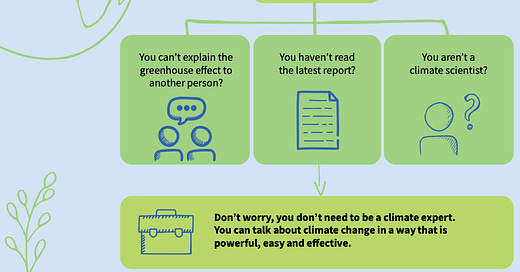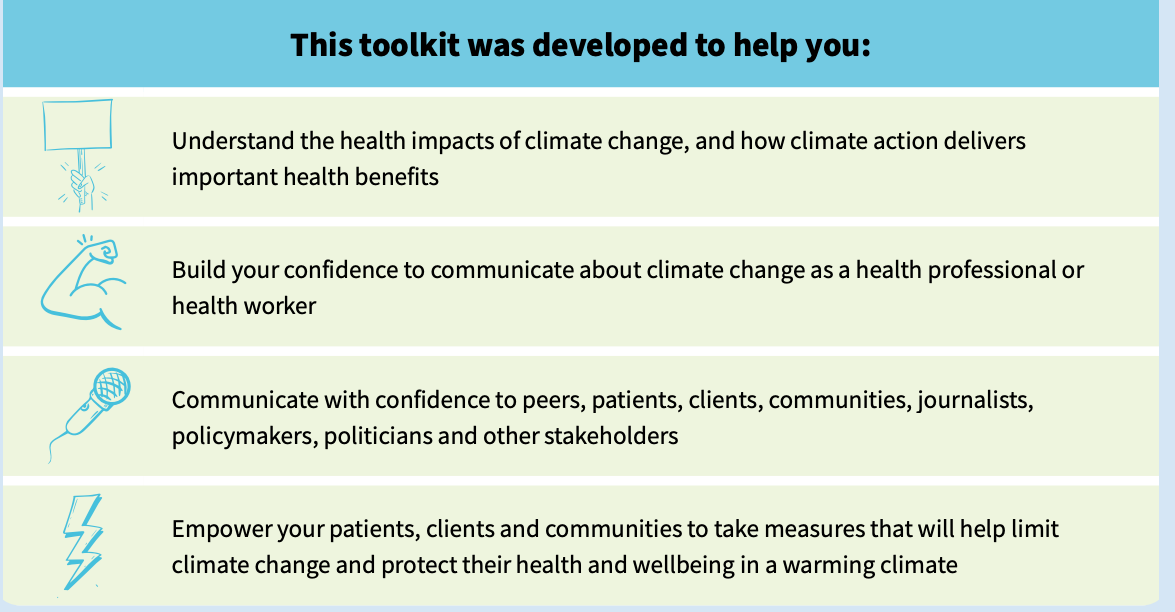WHO creates Climate Change toolkit for health care workers
you don't have to be a climate scientist to be a climate "expert"
You aren’t a climate scientist? Don’t worry, you don’t need to be a climate expert. You can talk about climate change in a way that is powerful, easy and effective.
Download your talking points here.
Communicating the health risks of climate change and the health benefits of climate solutions is both necessary and helpful. Health professionals are well placed to play a unique role in helping their communities to understand climate change, protect themselves, and realize the health benefits of climate solutions.
Why health professionals? Because they are a “trusted community voice.”
Health professionals wear many hats in society – one of which is a trusted community voice. This means that a health professional is well-positioned to communicate in ways that help protect human health from climate change.
Health care professionals are encouraged to “communicate with confidence to peers, patients, clients, communities, journalists, policymakers, politicians and other stakeholders.” (I wonder if some of these “experts” will be quoted in mainstream media?)
The WHO toolkit suggests that health care practitioners:
Convince a colleague to talk about climate change as well
Persuade a politician of the health impacts of their climate policy
Offer a journalist a quote for their article on climate change
Inform someone in your waiting room
Encourage social media followers to call their elected rep
It also provides 10 Top Tips of Climate-Health Communication: (9 and 10 are doozies)
1 Keep your message simple, and repeat it often
The most effective messages are simple and repeated often by trusted sources. By virtue of being a health professional, you’re already a trusted source on health. So, pick a simple message, and find ways of repeating it frequently in the conversation. If you’re getting tired of saying it, you’re doing it right.
2 Focus on human health
Talk about climate change as a health problem rather than as an environmental one. This helps your audience to see climate change as a local, concrete problem rather than an abstract, future problem. Likewise, talking about the health benefits of climate action brings the topic into the present and into your community.
3 Understand your local context
Explain how climate change will affect your own region to help your audience see it as a local, concrete problem. The health impacts of climate change vary widely across the world, from extreme heat exposure, to food insecurity, to novel disease exposure, to mental distress.
4 Don’t use jargon
Use simple, accessible language. Jargon and technical terms can confuse or even alienate the person you’re talking to. This applies to health jargon and climate jargon.
5 Empower people to make good decisions about their health
Let people know how they can protect themselves from the impacts of climate change. This empowers them to protect themselves and their families, and may reduce feelings of apathy or anxiety about climate change.
6. Talk about the health benefits of climate action
Let people know that climate action is good for our health. The solutions to climate action include renewable energy, active transport, local plant rich diets, and protecting green spaces. All these things are also good for our health and wellbeing.
7. Tell stories to connect with people
People connect to stories. If you have personal experience witnessing the health effects of climate change, share the story in a respectful way. Many people won’t remember scientific facts or statistics – they’re more likely to remember stories… An easy way to start is to tell your story: who you are (e.g. a concerned health professional) and why you care (e.g. because you are seeing the health impacts of climate change).
8 Avoid polarizing language
In a clinical setting, avoid terms like ‘climate crisis’ or ‘climate emergency’. While you might be very alarmed about climate change – for good reason – painting an image of doom and despair can have unintended effects on your patients. Some people become paralyzed with fear. Some people become desensitized to the claims and skeptical of the science.
9 Talk about climate change during extreme weather events
When appropriate, you can talk about climate change during extreme weather events. These events have been described as “teachable moments” about climate change. At these moments, climate change is likely to feel more tangible to your audience, and become more personally salient and meaningful.
10 Don’t debate the science
Don’t get caught up in conversations that question climate science. It’s not up for debate. If conversation veers into this territory, redirect it back to your professional expertise and the links between climate change and health.
Here’s a suggestion for what a doctor could say to a policymaker:
Climate change is here now, and I am already seeing the impacts on my patients’ health. The health of some people is affected more severely, including children and elderly people, disadvantaged communities, remote communities, and people with disabilities or chronic illness. Climate action is a ‘win-win-win’. It’s good for our health, it’s good for the economy and it’s good for the environment our community depends on. We already have the solutions. But we cannot delay in implementing them fully—we must act urgently. Every fraction of a degree matters when it comes to global heating
There are scripts for EVERYTHING they want you to know.
In case you’re wondering, doctors are also provided with scripts on how to talk about vaccines. Here are some samples scripts.
From the CDC:
From the WHO:
From the American Medical Association:
From Vaccine Safety Edu:
My advice? Find find people who can go off script.







I've just discovered Clinicians for Climate Change Action in New Jersey. Digging into this next.
https://states.ms2ch.org/nj/njcca/
Funny.
What is climate change ? ( rhetorical )
The climate changes. But of course. N'est ce pas? Everyday. Every hour.